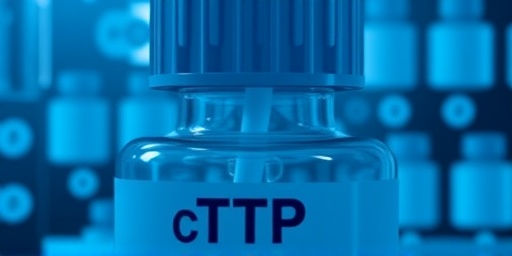Washington, DC – In a chilling development for rare disease treatments, the U.S. Food and Drug Administration (FDA) has launched an urgent investigation into the death of a pediatric patient treated with Takeda’s Adzynma, an enzyme replacement therapy for congenital thrombotic thrombocytopenic purpura (cTTP). The agency confirmed on Thursday that the child developed neutralizing antibodies against the therapy, potentially leading to treatment failure and fatal complications.
- Tragic Case Details: Child’s Rapid Decline After Adzynma Infusions
- Adzynma’s Rocky Path: From FDA Approval to Safety Red Flags
- Neutralizing Antibodies Emerge as Hidden Threat in cTTP Therapy
- Takeda Faces Scrutiny: Company Pledges Cooperation Amid Stock Dip
- Path Forward: Balancing Innovation and Safety in Rare Disease Treatments
This marks the first reported pediatric fatality associated with Adzynma since its approval less than two years ago, sending shockwaves through the hematology community. Reports from the FDA‘s Adverse Event Reporting System (FAERS) highlight multiple serious adverse events, including thrombotic episodes and immune responses, prompting heightened scrutiny of the drug’s safety profile in young patients.
Tragic Case Details: Child’s Rapid Decline After Adzynma Infusions
The incident involved a young patient under 12 years old, diagnosed with cTTP—a ultra-rare genetic disorder affecting roughly 1 in 100,000 people worldwide, characterized by severe deficiencies in the ADAMTS13 enzyme. This enzyme is crucial for preventing excessive blood clotting, and its absence leads to microthrombi formation, organ damage, and high mortality rates if untreated.
According to preliminary FDA disclosures and medical records reviewed by health authorities, the child received multiple infusions of Adzynma (recombinant ADAMTS13) as part of prophylactic enzyme replacement therapy. Initially, the treatment appeared effective, stabilizing platelet counts and averting acute TTP flares. However, within weeks, lab tests detected high titers of neutralizing anti-drug antibodies (ADAs), which bind to and inactivate the infused enzyme.
“The patient experienced a catastrophic TTP relapse,” stated Dr. Elena Vasquez, a pediatric hematologist not involved in the case but familiar with similar reports. “These antibodies rendered Adzynma useless, leading to disseminated intravascular coagulation, multi-organ failure, and death despite aggressive plasma exchange interventions.”
- Timeline of Events:
- Week 1-4: Successful Adzynma infusions; improved clinical markers.
- Week 5: Detection of ADAs via binding and neutralizing assays.
- Week 6: Acute TTP exacerbation with schistocytes, thrombocytopenia, and hemolysis.
- Week 7: Fatal outcome despite ICU care.
The FDA has classified this as a “suspected unexpected serious adverse reaction” (SUSAR), mandating immediate reporting from Takeda under post-marketing surveillance rules. As of now, three other U.S. cases of ADAs have been logged in FAERS for Adzynma, though none were fatal.
Adzynma’s Rocky Path: From FDA Approval to Safety Red Flags
Takeda Pharmaceutical Company, a Japanese biotech giant with a robust U.S. presence, received FDA accelerated approval for Adzynma in October 2022—the first-ever enzyme replacement therapy specifically for cTTP. Priced at over $2 million annually per patient, it promised a paradigm shift from reliance on plasma-derived therapies, which carry risks of allergic reactions and pathogen transmission.
Clinical trials, including the pivotal Phase 3 HERMES study, enrolled 18 adult and pediatric patients, demonstrating sustained ADAMTS13 activity levels above 50%—far surpassing plasma exchange benchmarks. “Adzynma represented hope for cTTP families,” said Takeda spokesperson Rachel Kim in a prior press release. “It could prevent lifelong relapses and improve quality of life dramatically.”
However, trial data hinted at immunogenicity risks: 22% of participants developed ADAs, though none were neutralizing at clinically significant levels during the study period. Post-approval, real-world use has exposed vulnerabilities, particularly in pediatrics where immune systems are more reactive.
| Key Trial Metrics | Adzynma | Plasma Exchange |
|---|---|---|
| ADAMTS13 Activity | >50% sustained | Variable, short-lived |
| ADA Incidence | 22% | N/A |
| Annual Cost | $2M+ | $500K+ |
| Pediatric Data | Limited (n=5) | Standard of Care |
The FDA’s current probe expands beyond this death, reviewing 15 adverse event reports since launch, including two hospitalizations for hypersensitivity. Regulators may impose a black box warning or restrict pediatric labeling if causality is confirmed.
Neutralizing Antibodies Emerge as Hidden Threat in cTTP Therapy
Neutralizing antibodies against recombinant proteins aren’t new—seen in hemophilia treatments like factor VIII—but their emergence in Adzynma underscores unique challenges for cTTP enzyme replacement therapy. cTTP stems from biallelic mutations in the ADAMTS13 gene, rendering patients null for functional enzyme from birth.
Experts attribute ADA formation to the drug’s novel structure: a full-length, plasma-derived-like ADAMTS13 produced in Chinese hamster ovary cells. “The immune system views it as foreign, especially in neonates with immature tolerance,” explained Dr. Marcus Hale, director of the International TTP Registry. “Preclinical models predicted this, but human data lagged.”
- Risk Factors for ADAs: Younger age, higher doses, lack of immune tolerance induction.
- Detection Methods: ELISA for binding ADAs, followed by Bethesda-like assays for neutralization.
- Mitigation Strategies: Dose adjustments, immunosuppression (e.g., rituximab), or gene therapy alternatives.
In Europe, where Adzynma launched earlier under the brand name Adzyncarta, the European Medicines Agency (EMA) reported similar ADA signals in pharmacovigilance updates. Takeda’s global safety database now tracks over 50 ADA-positive cases, with 10% neutralizing.
Takeda Faces Scrutiny: Company Pledges Cooperation Amid Stock Dip
Takeda issued a statement late Friday: “Patient safety is paramount. We are fully cooperating with the FDA, sharing all immunogenicity data, and implementing enhanced ADA monitoring protocols for ongoing patients.” The company has paused new pediatric enrollments in extension studies pending review.
Shares in Takeda (TSE:4502) fell 3.2% in Tokyo trading, reflecting investor concerns over potential label changes or litigation. Analysts at Jefferies noted, “Adzynma’s peak sales forecast of $1.5B is at risk if pediatric use is curtailed—cTTP’s small market amplifies any setbacks.”
The FDA’s Division of Hematology is convening an advisory committee next month, potentially mirroring actions taken with other biologics like Soliris for atypical HUS. Patient advocacy groups, including the cTTP Foundation, urge transparency: “Families deserve risk-benefit clarity before committing to lifelong infusions,” said founder Lisa Grant.
Path Forward: Balancing Innovation and Safety in Rare Disease Treatments
As the FDA investigation unfolds, stakeholders eye several next steps. Takeda is accelerating Phase 4 studies with ADA prophylaxis, exploring Fc-fusion variants to dampen immunogenicity. Meanwhile, gene therapy contenders like UniQure’s AMT-260 enter Phase 1/2, promising curative potential without chronic dosing.
For the 500-1,000 U.S. cTTP patients, options remain limited. Plasma exchange persists as a bridge, but with 20-30% mortality in acute flares. “This tragedy highlights the need for personalized medicine in ultra-rares,” Dr. Vasquez added. “Biomarker-driven screening for ADA risk could save lives.”
Regulators may mandate REMS (Risk Evaluation and Mitigation Strategies) for Adzynma, including monthly ADA testing. Long-term, this case could reshape FDA accelerated approvals, demanding more pediatric immunogenicity data upfront. cTTP communities await outcomes, hoping innovation endures without sacrificing the vulnerable.
Updates will follow as the FDA releases its investigation report, expected within 90 days.








